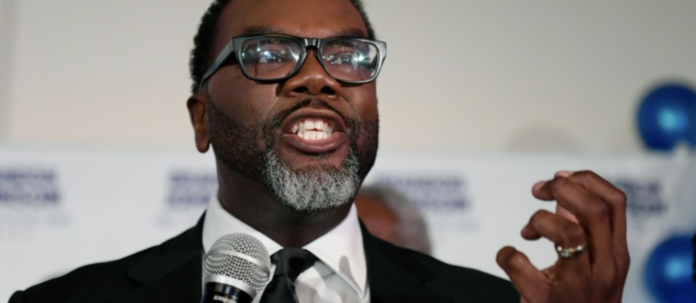You’ve got to appreciate brand-spankin’ new Chicago Mayor Brandon Johnson for being so forthright about what he intends to do to his struggling city. Johnson promised at his inauguration on Monday to “build a Chicago that means our economy gets to grow by rerouting the rivers of prosperity to the base of disinvestment,” whatever that means, “So that no one goes thirsty.”
What it really means is new and higher taxes, and Johnson’s “progressive” allies, Saqib Bhatti and Gabriela Noa Betancourt, stepped immediately into action, releasing a fiscal blueprint for the city called “First We Get the Money.”
The name was chosen by the Action Center on Race and the Economy (ACRE) policy organization after “Pay Up, Sucka” scored slightly lower with focus groups.
The package includes a metric butt-ton of new spending, naturally, but it’s the $12 billion in new taxes that will make people scream in agony. For reference, Chicago’s “historic” “recovery” budget last year was “just” $16.7 billion.
New or increased taxes include but are not limited to:
An annual head tax of $33 per worker for companies with 50+ employees
Quadruple the tax on jet fuel.
A 3.5% income tax on households making more than $100K
A 0.4% “wealth tax” for the top 10% of city earners.
$1-2 transaction tax for financial exchanges.
Needless to say, the taxes mostly hit one kind of Chicagoan with two particular (but related) skills: The ability to pay and the ability to get the hell out of Dodge and not pay.
Think I’m kidding? The Chicago Mercantile Exchange — founded in the city in 1898 and one of the largest trading floors in the world — on Monday threatened to relocate out of Chicago.
The Merc leaving Chicago would be like the NYSE decamping for Tampa, taking with it all of the high-paying jobs with those high-flying bonuses and destroying all the attendant service-sector jobs.
Besides, even before COVID-19 lockdowns and Saint George Floyd nuttiness had Americans fleeing for the burbs, Chicago was already the fastest-shrinking metro area in the country.
Progressives like ACRE might try to impose $12 billion in taxes, but they’ll never collect them. What they can do, though, is accelerate Chicago’s slow-motion suicide.
If there’s any good news in all this, it’s that the Chicago Machine might be corrupt and greedy, but they aren’t insane. They couldn’t manage to fix the election for Johnson’s challenger, the slightly-less-nutty former Chicago Public Schools CEO, Paul Vallas. But I suspect they’ll bring everything they can to fight whatever version of “First We Get the Money” that Johnson ends up going with.
The bad news? With a shrinking tax base and ravenous progressives firmly in charge, at the very least some stripped-down version of “Pay Up, Sucka” will be imposed. And before long, Mayor Johnson and his ACRE allies will wonder where all the taxpayers have gone.


